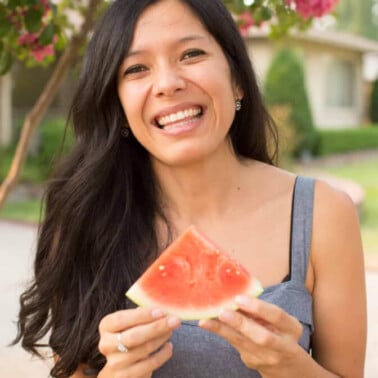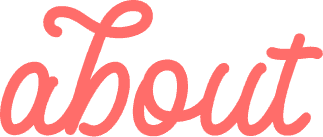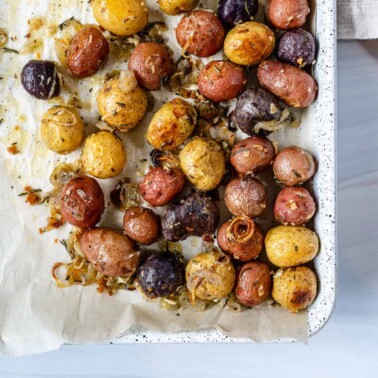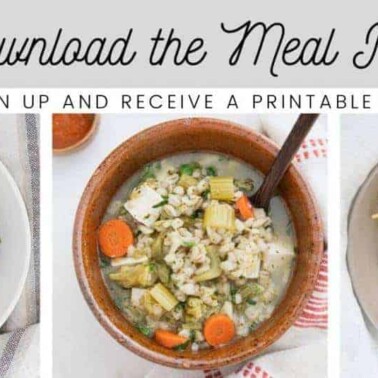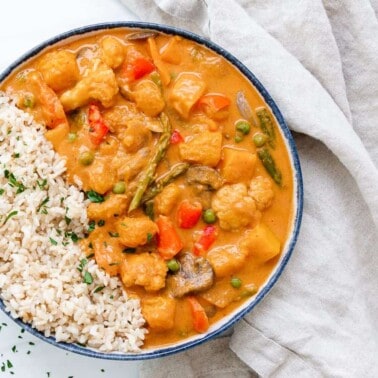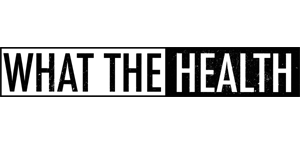As an Amazon Associate I earn from qualifying purchases.
By Josie Steiger
I’d like to preface this post with the following message: I am speaking from my own personal experience. Each person and each pregnancy is different. There are things that happen to you during pregnancy that you can’t control, and I don’t want anyone to walk away from reading this thinking that they or their bodies are not good enough in some way (we get enough of those messages out there in the rest of the world). I am writing this in the hopes that it helps someone looking for resources to answer their questions about vegan pregnancy. I am not a medical professional. Please consult a medical doctor, midwife or registered dietitian for medical advice.
As I sit and write this today, I’m 32 weeks pregnant (pregnancy is normally counted as 40 weeks) and have been vegan for over six years. Although my body is starting to get pretty uncomfortable at this point, being a pregnant vegan woman has, overall, been a very empowering and positive experience.
One of the top questions my vegan husband and I get asked is about what weird food cravings I’ve had. As much as I’d love to tell people that my partner had to run out to the grocery store at midnight for pickles and coconut milk ice cream, that simply hasn’t been the case. My number one craving? Rice and beans. Whether omnivore or vegan, your protein needs increase dramatically during pregnancy, so be sure to educate yourself on how many grams you specifically will need daily. I get my protein needs met from beans, peas, tofu, nuts and nut butter, spinach, vegan meats, protein shakes, and for convenience, the occasional plant-based protein bar.
According to the American Pregnancy Association, foods you should avoid during pregnancy include raw or undercooked meat, deli meats, raw or undercooked eggs, unpasteurized milk, pate (meat spreads), soft cheeses, and various fish, shellfish, and seafood, due to mercury and bacteria that are prevalent in these foods. Guess what? Simply by being vegan, I’ve automatically eliminated all of those hazards from my diet. It’s nice to have one less thing on my plate I need to avoid (literally and figuratively).
Although not always posed as a question, some people have implied to me that they don’t think it’s safe to be pregnant and vegan. On the contrary, research and experience show that everything your body needs for a healthy vegan pregnancy can be found in plants—no animal products are necessary. In fact, a growing body of evidence confirms that consuming animal products during pregnancy leaves you and your baby at increased risk of a wide variety of negative health outcomes.
Also, because I’m a smaller person in stature, I’ve heard comments from observers that I haven’t gained enough weight during my pregnancy, to which I truthfully reply, “My doctor and midwife say that I’m right where I need to be at this stage.” (The average recommended weight gain through the pregnancy is 25-35 pounds).
Again, I can only speak for myself, but I believe that a balanced vegan diet, taking vitamins, staying hydrated and getting exercise have all contributed to me feeling well. My pregnancy hasn’t been perfect; throughout my first trimester I had morning sickness and in this third trimester at times I’ve experienced pretty terrible nausea and heartburn. If you’re feeling nauseous and having a hard time eating or can only eat very little, make sure that whatever you do eat is as nutritious as possible. Even if you can only get a few bites down, make those bites count! Also, at various times I found that fresh papaya, water with lemon juice (or apple cider vinegar, or a spoonful of baking soda) or no-chicken broth from the bulk foods section have all helped me to feel better when nausea was getting the best of me.
I’ve been seeing a doctor and a midwife, and both agree that I’ve had a normal, healthy pregnancy. I’ve also found that it’s really important for me to educate myself on vegan nutrition and to be my own advocate. Doctors notoriously only get a few hours of nutrition training while in medical school and, in my experience, aren’t often up to date on nutritional needs. In general, midwives seem more open to vegetarianism, but I’ve still found opportunities to educate my midwife on vegan nutrition.
I also became pretty suspicious when the healthy eating handout I was given at my doctor’s office was created by the Dairy Council of California. You’ll be shocked to learn that it recommended consuming more dairy products (3 cups daily) than vegetables (2.5 cups), fruit (1.5 cups), grains (6 oz.), or beans (5 oz). And, of course, no mention was made of any health risks associated with dairy consumption during pregnancy.
Gestational diabetes and anemia (lower than normal number of healthy red blood cells) are two health issues that are pretty common during pregnancy. If you are a vegan that experiences these issues, don’t automatically assume that veganism is to blame—and don’t assume that there aren’t plant-based fixes either! Finally, please don’t assume that you are doing something “wrong.” I encourage you to work to understand whatever issue you are facing and find a path to fix it that you’re comfortable with.
Here are some resources that have really helped me during my pregnancy:
- The Kind Mama by Alicia Silverstone (my favorite pregnancy book, covering everything from pre-conception to toddlerhood!)
- Vegan Pregnancy Survival Guide by Sayward Rebhal
- The Everything Vegan Pregnancy Book by Reed Mangels, PhD.
- NutritionFacts.org
- VeganPregnancyAndParenting.com
- VeganHealth.org
Because this is a food and budget focused blog, I’d be remiss not to include a sampling of what I eat in an average week, including some supplements I take. Here are a few staples, and I always choose organic options if possible:
- Rice, beans and avocado
- Lentil or black bean soup
- Grapes, apples, papaya, oranges and other fresh fruit (be sure to wash fruits and vegetables well!)
- Peanut butter on bananas
- Whole grain cereal and plant milk
- Sandwiches that include whole grain bread and Tofurky slices
- Fresh or cooked greens and/or carrots
- Mixed vegetables and tofu
- Ground flax seeds (buy them in the bulk section and grind them in a coffee grinder if you have one).
- Orange Juice
- Rainbow Light Prenatal Vitamins
- Doctor’s Best Vegetarian DHA
- Nature’s Life Acidophilus Probiotic
- Floravital Iron Supplement (a spoonful of black strap molasses daily is another great, cheap, plant-based way to get iron and potassium).
I could go on and on, but I’ll stop here for now. I hope this post serves its intended purpose to empower vegan parents and to show you that you can be happy, healthy, plant-based (and pregnant!) on a budget!

